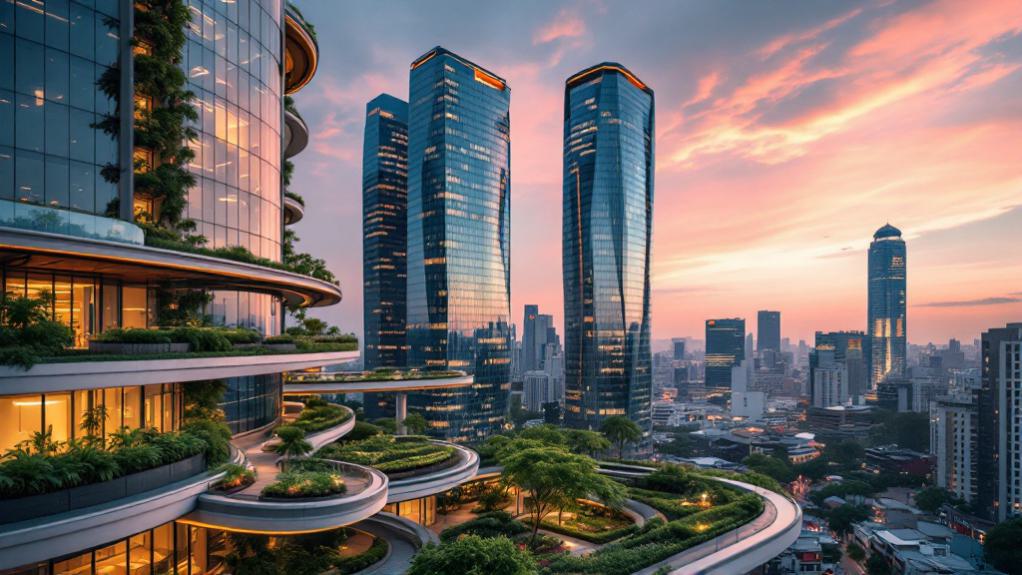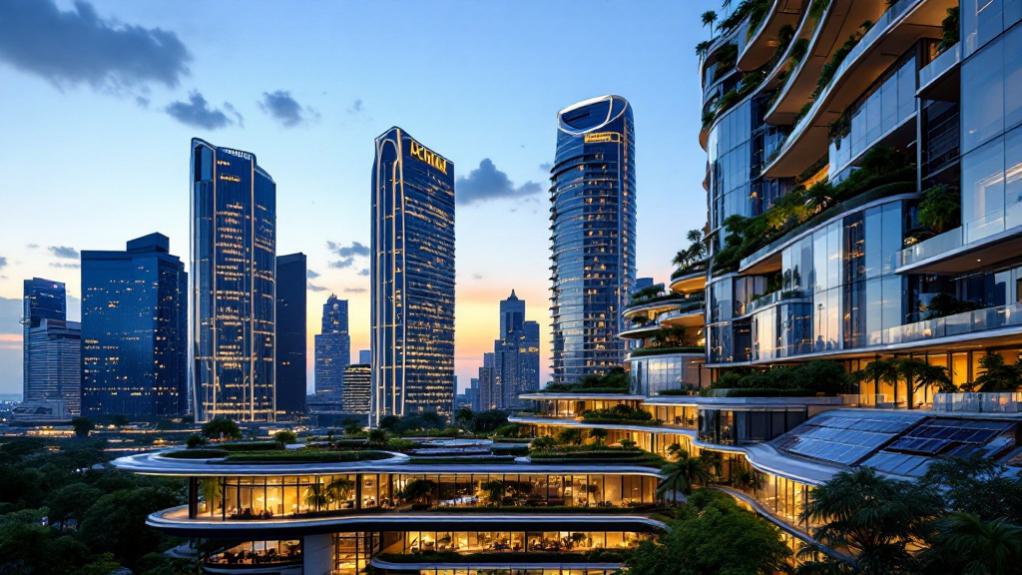Singapore’s commercial property market shows resilience despite global uncertainties, with investment volumes reaching USD 4.1 billion in Q4 2023. Prime logistics is projected to achieve the highest rental growth, while CBD Grade A office rents are forecasted to rise by 1.0% year-on-year. Industrial vacancies hit a 10-year low of 9.5%, with data centers emerging as a preferred asset class. ESG-compliant properties and AI-enhanced buildings are gaining institutional interest, particularly in the developing Jurong Lake District. Further sector analysis reveals promising growth trajectories.

Singapore’s commercial real estate landscape stands at a pivotal juncture, with investment volumes reaching USD 4.1 billion in Q4 2023, signaling robust market activity despite global economic uncertainties. The market outlook for 2025 remains broadly positive, with rental growth anticipated across all sectors, though investors are proceeding with increased selectivity due to elevated financing costs.
Importantly, the prime logistics sector is projected to achieve the highest rental growth among commercial property segments, reflecting the sustained demand for industrial and logistics facilities.
The office sector continues to evolve with Core CBD Grade A rents forecast to rise by 1.0% year-on-year in 2023, while office utilization has stabilized between 70-80% as hybrid work arrangements become standardized. These trends span across Singapore’s property regions, including the Core Central Region where premium commercial spaces command top valuations. Demand patterns are shifting, with non-banking financial institutions, legal advisory firms, and FMCG companies now driving office space requirements.
Prime office rents have surpassed S$11 per square foot, while planned supply increases, particularly in the developing Jurong Lake District. This upward trend is evidenced by the significant growth in Raffles Place/Marina Bay, where rents increased by 5.1% YoY as of Q3 2023.
Retail properties demonstrated resilience with rents growing 0.2% year-on-year in Q4 2023, accompanied by a decline in the island-wide vacancy rate to 6.5%. The Orchard Road shopping district is undergoing significant rejuvenation efforts, while mixed-use developments increasingly attract investor attention despite ongoing competition from e-commerce platforms.
Simultaneously, the industrial real estate segment exhibits robust growth metrics, with Multi-User Factory vacancies reaching a 10-year low of 9.5%. The growth in technology and e-commerce sectors has significantly increased demand for data centers and logistics facilities.
Investment strategies are diversifying, with data centers emerging as a preferred alternative asset class by 2025. ESG-compliant and green-certified properties are garnering substantial institutional interest, while private capital sources remain active participants.
The technological transformation of commercial real estate continues unabated, with AI solutions, smart building technologies, and energy-efficient properties commanding premium valuations. Government initiatives further support market development through the Government Land Sales Programme and incentives for environmentally conscious developments, particularly in the Jurong Lake District, which is being positioned as Singapore’s largest business district outside the central area.
Frequently Asked Questions
How Will Remote Work Affect Office Space Demand in Singapore?
Remote work has markedly impacted Singapore’s commercial real estate landscape, evidenced by Grade A CBD office space take-up declining to 370,000 sq ft in 2023 from pre-pandemic averages of 1-1.2 million sq ft.
Companies are increasingly rightsizing their portfolios, with suburban locations outperforming CBD by up to 30% in 2024.
Despite this shift, a flight to quality persists, with premium, green-certified buildings maintaining demand while office supply for 2025-2029 is projected 34% lower than the previous decade.
What Tax Incentives Exist for Commercial Property Investors?
Singapore offers several tax incentives beneficial to commercial property investors, including property tax rebates of up to 100% for qualifying non-residential properties.
There are also stamp duty exemptions with no Additional Buyer’s Stamp Duty or Seller’s Stamp Duty on commercial transactions.
The Land Intensification Allowance provides 25% initial and 5% annual allowances on qualifying expenditure.
Additionally, the Investment Allowance offers up to 100% tax exemption on fixed capital expenditure for approved projects.
Are Green Buildings Commanding Premium Rents in Singapore?
Green buildings in Singapore command a 4-9% rental premium, which is lower than neighboring Asian markets due to the high supply of certified properties.
With 90% of Grade A office stock being green certified, this limited premium reflects market saturation rather than lack of demand.
Corporate ESG mandates, operational cost efficiencies, and superior indoor environmental quality continue to drive tenant preferences, while non-certified buildings increasingly face “brown discounts” as sustainability regulations tighten.
How Are Proptech Innovations Changing Property Management Practices?
PropTech innovations are fundamentally transforming property management practices through multiple technological advancements.
AI-powered chatbots now handle 65% of tenant inquiries with 80% faster response times, while smart building systems reduce energy costs by 20-30%.
Predictive maintenance algorithms have decreased unexpected repairs by 40%, and blockchain applications have streamlined transactions, reducing processing time by 90%.
Additionally, virtual tours have increased property viewings by 300%, markedly reducing the need for physical showings by 50%.
What Financing Options Are Available for Commercial Property Acquisition?
Commercial property acquisition financing encompasses multiple avenues including traditional bank loans offering up to 80% loan-to-value ratios with tenures extending to 30 years.
Government initiatives such as Enterprise Singapore’s Financing Scheme and JTC’s Land Intensification Allowance also play a role in this financing landscape.
Additionally, equity-based options through REITs and private equity firms provide mezzanine financing.
Alternative methods include green loans, Islamic financing, convertible bonds, peer-to-peer lending platforms, and vendor financing arrangements for buyers seeking non-traditional capital solutions.





